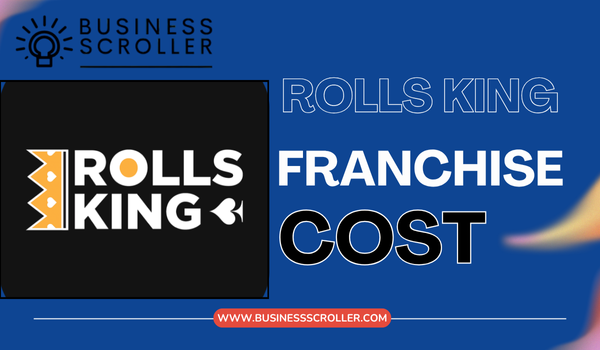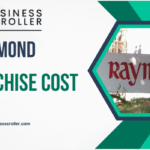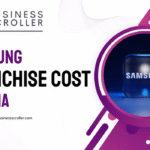If you’re considering entering the QSR (Quick Service Restaurant) industry in India with a brand that specialises in kathi-rolls and street-food style fare, then Rolls King is a name worth examining. This blog post, built from publicly available trusted sources plus practical insights, covers the franchise model of Rolls King, estimated investment/costs, expected returns (ROI), eligibility criteria for partners, and a step-by-step guide to apply.
Why Consider a Rolls King Franchise?
- Rolls King is a niche QSR brand focused on roll/kathi-roll formats (and associated fast food), which enjoys good appeal among youth, college locations, malls, high-streets. For example, one site reports “Rolls King in few years become an important brand name… started 2011 … roll in the idea of serving kathi roll…”
- Entry investment appears to be moderate compared to some full-service restaurants, making it accessible to aspiring entrepreneurs.
- The format is suitable for smaller store sizes (sometimes 100-250 sq.ft) which means lower real-estate/rent burden in the right location.
- With a good location, strong management, and brand support, the payback and profitability look promising.
However—as with all franchises—the success will hinge greatly on location, footfall, rent & lease terms, efficient operations, and brand-support/compliance.

Franchise Model: How Rolls King Structures It
Here’s how the brand appears to approach its franchise offering, based on available data and standard practices:
- The model is Franchise-Owned / Franchise-Operated (FOFO) meaning you as the franchisee invest, run the store, and follow the brand’s systems.
- Franchise fee: you pay an upfront fee to obtain rights to use the brand, systems, training, etc.
- Setup investment: you must secure a site (lease/own), execute interiors, kitchen equipment, signage, staff, etc.
- Royalty/Commission: after launch you pay a percentage of gross sales (or a fixed fee) to the franchisor for ongoing support, marketing, brand usage. For example one source lists 5% of gross sales.
- Store size: varies by format, though cited size requirements include ~100-250 sq.ft for smaller formats.
- Agreement term: typically 5 years (renewable) which is common in the food-franchise sector in India.
- Location criteria: High footfall areas, near colleges/offices/malls, street-front in commercial/residential zones. One older source noted for Rolls King “800-1200 sq.ft” for some formats.
In short: you invest, adopt the brand’s system, get support (training, maybe supply chain), open the store, pay royalties, and benefit from the brand’s recognition and marketing.
Cost & investment: What is required to start
Here are realistic estimates based on sources, broken down and with commentary.
Investment range
- According to one listing: ₹10 lakh to ₹20 lakh as investment range for a Rolls King unit (covering franchise/brand fee, setup, inventory) for 100-250 sq.ft format.
- Another (older) source gives a much higher investment: ~₹28 lakh for a “restaurant model” for Rolls King with ~800-1200 sq.ft area.
- Yet another article puts between ₹15 lakh – ₹25 lakh total investment (depending location, store size).
So you can summarise: for a smaller kiosk/take-away format in a good but moderate location you might invest ~₹10-20 lakh; for larger format (restaurant model) you may need ~₹25-30 lakh or more depending on region.
Typical cost components
- Franchise / Brand Fee: ~ ₹2 lakh (or more) per store in smaller format.
- Setup Costs (interior, furniture, kitchen equipment, signage): could be ₹3-10 lakh depending size and finishes.
- Initial Inventory/Raw Material Stock + Pre-opening costs & working capital: few lakhs. Example from one source: for “restaurant model” investment breakdown included franchise fee ₹15 lakh, setup cost ₹5 lakh, machinery & equipment ~₹2 lakh, etc.
- Royalty/Commission: ~5% on gross sales (in smaller investment format).
- Real estate/rent: though not provided as a fixed part of the investment breakdown in all sources, this will be one of your major recurring costs—location and size will determine a large part of viability.
Example table
| Item | Range (₹) |
| Franchise/Brand fee | ~2 lakh – 6 lakh+ |
| Setup (interior, equipment) | ~3 lakh – 10 lakh+ |
| Initial inventory, working capital | ~1 lakh – 5 lakh |
| Total conservative investment (small format) | ~₹10 lakh – ₹20 lakh |
| Total larger restaurant model investment | ~₹25 lakh – ₹30 lakh+ |
Important caveats
- These numbers are estimates from third-party listings. Always ask the franchisor for the official franchise disclosure pack with exact numbers for your city/location.
- Your location, store format (takeaway vs dine-in), city (Tier-1 vs Tier-2), rental terms will hugely affect the investment and operating cost.
- Working capital buffer is essential—first few months may see lower sales while you ramp up.
ROI & pay-back: What to expect
From the sources:
- One site: estimated ROI (return of capital) in 1-2 years for 10-20 lakh investment model.
- Another article: With assumed sales and margins for Rolls King: e.g., if gross sales ~₹3,00,000/month then net profit maybe ~₹30,000/month (for given cost assumptions) and margin ~10% at early stage; with growth margin could go ~19%.
- Source: “Total investment … pay-back period of 1-2 years.”
What drives ROI
- Sales volume (footfall, average spend): High footfall locations (malls, high-streets, college areas) increase sales.
- Cost control: Especially rent, staff cost, raw-material wastage, utilities.
- Store size and format: Smaller formats with efficient use may pay back faster; dine-in models may take longer.
- Brand support / marketing: Good support from franchisor and strong local marketing improves admissions.
- Recurring customers / delivery tie-ups: With online food-delivery platforms and walk-in traffic the mix matters.
- Operations: Service speed, hygiene, menu refresh matter in QSR.
Practical outlook
If you invest ~₹15-20 lakh in a decent location; assume you can get say ₹3-5 lakh/month gross sales (depending on city/format), with net margin say 15-25% (after all costs) you might earn ~₹45,000-₹1,25,000/month. At that rate you could pay back investment in ~12-24 months (depending on amortisation, reinvestment, additional cost). But note this is optimistic; under less favourable conditions payback might stretch to 2-3 years.
Eligibility: Who is suitable to partner
When you apply for a Rolls King franchise you should ideally meet these criteria:
- Good financial capability: ability to invest capital + run initial months without heavy losses.
- Suitable real estate/lease: You should either already have, or be able to secure, a location with high footfall, in one of the brand’s acceptable formats, meeting size requirements (100-250 sq.ft for smaller model; more for larger) as quoted.
- Retail or food service experience is beneficial (though some brands may allow first-timers with strong commitment).
- Alignment with brand’s operating standards: hygiene, service, branding, training compliance.
- Willingness to follow brand SOPs, training, and participate in local marketing and inventory systems.
- Commitment to manage the outlet (or hire a competent manager) and run operations with focus.
Location & format specific
Given the size requirements and brand’s focus on QSR/rolls, ideal locations include: shopping malls, food courts, college/office clusters, high-street commercial/residential intersections. A smaller take-away kiosk in a high-traffic zone may be more affordable and quicker to launch but needs smart location pick.
Steps to apply: A practical roadmap
Here’s a step-by-step process for you to apply for a Rolls King franchise:
- Initial self-assessment
- Decide your budget/investment capability.
- Choose target city/town, ideal format (take-away kiosk vs dine-in outlet).
- Survey possible locations and rent/lease terms (expect high footfall zones).
- Check your business experience, management bandwidth, readiness.
- Research & short-list franchise information
- Visit Rolls King’s official franchise page(s) or contact the franchise development team. For example the listing on FranchiseIndia gives details.
- Ask for the official Franchise Information Pack: cost breakdown, royalty/commission terms, support package, approved formats, territory rights, length of agreement.
- Prepare application & documentation
- Prepare your business profile: personal background, investment capacity, proposed location, your team/manager if applicable.
- Provide any previous retail/food business experience (if any).
- Include details of proposed site: address, lease status, photographs, size, anticipated rent.
- Submit necessary identity and financial proofs as the franchisor may evaluate.
- Site evaluation & interview
- Rolls King team will evaluate the location (footfall, visibility, competition, accessibility).
- You may be interviewed to assess fit, operations plan, willingness to maintain brand standards.
- Franchisor may suggest changes or approve the format (takeaway/kiosk vs restaurant) based on site.
- Agreement & payment
- Review the franchise agreement carefully: investment schedule, franchise fee, royalty/commission %, territory/exclusivity clause, duration of agreement, renewal terms, termination clause.
- Make first payment (franchise fee) as agreed.
- Sign the agreement once both parties are aligned.
- Outlet setup & training
- Secure lease or purchase of site.
- Fit-out the store as per brand’s interior and equipment standards (design, signage, kitchen layout).
- Recruit staff (cooks, service), train via Rolls King training programme (brand should provide training on food prep, service, inventory, hygiene).
- Arrange initial inventory, POS systems, packaging, menu, marketing launch plan.
- Soft launch & full launch
- Do a soft opening to test operations, feedback, refine processes.
- Launch marketing campaign (local promotions, social media, possible tie-ups with delivery apps).
- Monitor operations closely: sales, waste, staff productivity, service speed.
- Ongoing operations & growth
- Follow brand SOPs, maintain quality, monitor cost and profitability.
- Track KPIs: average transaction value, sales per sq.ft/day, labour cost %, food cost %.
- Evaluate opening of additional outlets or alternate formats if the first performs well.
Additional practical tips & caution points
Tips
- Choose location wisely: For a roll/kathi-roll QSR, being near colleges, high-traffic shopping/food court zones, commercial clusters helps.
- Negotiate rent/lease: Rent often makes or breaks profitability in food retail; try secure favourable terms with ramp-up or fit-out support.
- Focus on food cost and kitchen efficiency: QSR margins are tight; controlling food cost, wastage, speed of service is essential.
- Leverage delivery & online drives: Integrating with food-delivery platforms and local digital marketing gives incremental revenue.
- Understand royalty/commission structure: Make sure you build it into your financial modelling.
- Build buffer for initial months: First 3-6 months may be slower while you build brand awareness locally; plan working capital accordingly.
Red flags / caution
- If the franchisor asks for large hidden fees or doesn’t disclose royalty/marketing contributions clearly.
- If the location proposed has very high rent or low footfall—despite franchise promises.
- If the brand’s support/training appears weak or not clearly spelled out.
- If the agreement has very long lock-in period with heavy penalties for exit—this reduces flexibility.
- If there is no transparency on actual performance of existing outlets (you should try to talk to other franchisees).
Final Thoughts
A Rolls King franchise offers a compelling entry into the food-service industry in India, especially for entrepreneurs looking at a moderate investment with a well-recognised brand in a roll/kathi-roll niche. With an investment range typically ₹10-20 lakh for smaller formats and possibly higher for dine-in models, and a business model that—if executed well—can aim for pay-back in 12-24 months, it is a viable opportunity.
But success doesn’t come automatically. Key factors will include location selection, controlling costs (rent, food cost, labour), managing operations efficiently, and leveraging brand training/support. Before committing, ensure you obtain the official franchise pack from Rolls King, model your financials conservatively, review the franchise agreement carefully (ideally with legal counsel) and have a realistic plan for month-1 to month-18 operations.

Shashi Kant is the Founder and Editor of BusinessScroller.com, a leading platform for business insights, finance trends, and industry analysis. With a passion for journalism and expertise in business reporting, he curates well-researched content on market strategies, startups, and corporate success stories. His vision is to provide valuable information that empowers entrepreneurs and professionals. Under his leadership, BusinessScroller.com has grown into a trusted source for in-depth articles, customer care guides, and financial expertise.



franchise